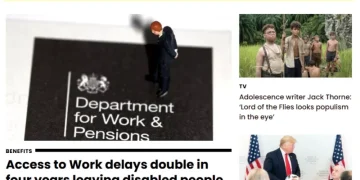FUMING farmers today accused Rachel Reeves of a “kick in the bullocks” as they warned her “crippling” inheritance tax raid could spark food shortages.
Agricultural workers threatened to go on strike as they railed against a new 20 per cent levy slapped on land and equipment worth over £1m, passed down after a death.



Rachel Reeves announced the major change to inheritance tax at the Budget on Wednesday[/caption]
The Chancellor was also accused of “signing a death warrant” for thousands of multi-generational businesses as inheritance tax was imposed on family-run firms for the first time since 1970.
Gareth Wyn Jones, who runs Tyn Llwyfan Farm in Wales, told The Sun: “I’m sure Labour could’ve found a better way to find money than targeting working class family farms.
“It’s heart-breaking, it just feels like another kick in the bullocks.”
Mr Jones added that the raid, estimated to hit 70,000 farms, could force families to sell off their land.
READ MORE POLITICS
And despite raising just £500m for the Treasury per year, it could lead to a huge drop in home-grown food supplies and increased dependence on foreign produce.
Mr Jones said: “Affordable food is produced by farmers.
“What we’re going to do is lose land.
“If these family farms are hit with a big bill after a bereavement they’ll have to sell.”
Clive Bailey, an arable farmer in Staffordshire, said the agricultural sector could unleash “massive disruption” in response to the Budget.
He told Times Radio: “When people find themselves in situations where they have nothing to lose, they become quite dangerous people.
“Farmers have a huge ability to cause massive disruption if they went that route.”
“But that turns into a modestly negative impact by the end of the parliament.
The “trick and treat” Halloween package included:
- A freeze to fuel duty for a 15th consecutive year in a win for The Sun’s Keep It Down campaign
- A penny off a pint by cutting draught beer duty, but raising booze taxes on other drinks
- A gloomy forecast of sluggish growth is a blow to Labour’s flagship mission
- A stamp duty rise for second-home buyers of two percentage points
- A pay rise for millions as the minimum wage was increased by £1,400 a year
- A hike to a packet of cigarettes as smoking duties were raised
- A new tax on vapes ahead of the looming ban on disposable e-cigs
- Higher taxes on air passenger duty for private jets that hit the wealthy
- A benefits crackdown with Ms Reeves telling jobless Brits to “get back to work”
- An increase to the state pension of £473 next year through the triple lock
- An inheritance tax raid through freezing the rates people pay
- An increase to the Carer’s Allowance to give cash to 60,000 more carers
Richard Payne, a farmer in Somerset, said he’s urged his son not to continue the family career tradition as it’s become “completely unviable” after the Budget.
He added that unpopular “factory farms” could soon be all that remains of the industry.
Mr Payne told the BBC: “Right across the land there will be a sea-change for the worse.
“Everyone says they don’t like mega-farms and they don’t want factory farming, but I can see that will be one answer out of all of this.”
On Thursday Tory MPs warned the Budget could “spell the end of family farms and UK environmental ambition”.
They accused Environment and Farming Secretary Steve Reed of betraying the sector, having promised last year “we have no intention of changing” inheritance tax on farmland.
The National Farmers Union said the move would “snatch away the next generation’s ability to produce food”.
Former Labour Chancellor Ed Balls today admitted it could “become a growing issue” for the government.
On his Political Currency podcast he said: “It’s one of those things where you just wonder, ‘Has the Treasury really thought through all the hard cases’”.
Mo Metcalf-Fisher, Director of External Affairs for the Countryside Alliance, told The Sun: “This is a hammer blow to small family farmers across the country, who work hard to produce food for us to eat and who only want to be able to pass down their farm to the next generation.
“I fear the Chancellor has grossly underestimated the anger and hurt this announcement has caused in the countryside”.
Rachel Reeves raids pension pots
By Lana Clements, Assistant Consumer Editor
The Chancellor announced that private and workplace pensions will no longer be exempt from inheritance tax from 2027.
At present, any money in your pension when you die can be passed on free of death duties, meaning they are a tax-efficient way of passing on cash to loved ones.
But the new plans mean any cash in your pension pots will be added to the value of your estate and could incur a tax bill.
You can pass on up to £325,000 tax-free when you die while couples who are married or in civil partnerships can combine their allowances and pass on £650,000.
Anything over that is taxed at 40 percent. Although, there are extra allowances for homes.
At present, only 5 percent of households pay inheritance tax – but now pensions group Canada Life says that number will almost double by 2030.
The new rules will affect those with modern defined contribution pensions.
It’s unclear whether those who’ve saved into protected funds will be affected by the move.
Nigel Green, the CEO of the deVere group, said: “Many pension holders, particularly those who have saved for years, never anticipated having to navigate such a significant change.
“The potential ripple effects are staggering: increased financial anxiety among retirees, a hastening of pension fund withdrawals, and the gutting of a system designed to support families long-term.”
Defending the move, the Chancellor insisted that landowners should pay tax in the same way “middle class families do”.
She said: “73% of farms and agricultural property will not be affected at all by these changes, so this does protect smaller farms.
“At the moment, you can have some of the wealthiest landowners, not farmers, in this country who pay no inheritance tax whatsoever, while middle class families do.
“That is not right, and that’s why we’ve closed that loophole.”
Meanwhile, the Chancellor was blasted for imposing 20 per cent inheritance tax on previously exempt family-run firms worth over £1m.
Levy relief for multi-generational businesses were introduced by Labour in the 1970s.
Funeral director Charlie Field, whose business dates back 300 years, told The Sun the tax could be a “final nail in the coffin”.

Mr Field’s firm, CJP Field, was founded in 1690 and currently employs more than 300 people.
He said: “The Chancellor’s ill-thought-out intervention in the Budget could spell the death of multi-generation businesses, including my own, across the UK.
“It’s all pain and no gain from this Labour government and we now face years of misery and anxiety thanks to the Chancellor.
“I only hope Rachel Reeves sees sense and U-turns on this terribly damaging measure.”
Neil Davey, Chief Executive of Family Business UK said he’d spent months warning the Treasury that removing relief for ancestral businesses would devastate the economy.
He slammed Ms Reeves for failing to take up his advice and implored her to make an urgent U-turn.
Mr Davy said: “Inheritance tax reliefs are not loopholes, as they are so often characterised. They are integral tax policies, introduced by a Labour Government in 1976, to ensure that businesses and farms do not have to be broken up on the death of the owner, to the detriment of all the remaining employees, suppliers, customers, investors, the Treasury and wider economy.
“If the Government is serious about delivering growth for this country family-owned businesses are ready to support that the objective but need security over their futures to plan in the long term.”
The People's Verdict
Business owners, families and working Brits have given their verdict on Rachel Reeves’ £40billion tax bomb budget.
The Chancellor today used the first Labour Budget in almost 15 years to hike National Insurance contributions from businesses by 1.2 per cent – in a £25bn raid on firms.
The extra levy is the equivalent of £800 per employee, while investment firm AJ Bell said the cost of hiring a new staff member would rise by £2,300.
The first female Chancellor also announced a reduction to the threshold businesses start paying NICs from £9,100 to £5,000.
It raised fears that workers will bear the brunt of the increase and sparked accusations it breaches the party’s manifesto pledge not to raise taxes for working people.
The National Living Wage will also rise by more than six per cent – triple the rate of inflation – to £12.21 an hour for over-21s.
It means millions will get a huge pay boost, though some firms say the rise will push up costs.
Meanwhile, the NHS will get a huge £22billion investment in a bid to fast-track improvements and reduce record-high waiting lists.
Business owners, tradies, students and workers across the country have given their verdict on the measures, telling The Sun that higher tax rates could trigger a string of consequences for their lives.
They include toolmaker Conrad Pearson, who warned Reeves’ measures would cause him to cut someone from his five-strong toolmaking team.
He said: “As soon as this was announced one of my lads said I’d have to pay him more, otherwise unskilled and less experienced staff would be catching him up.”































